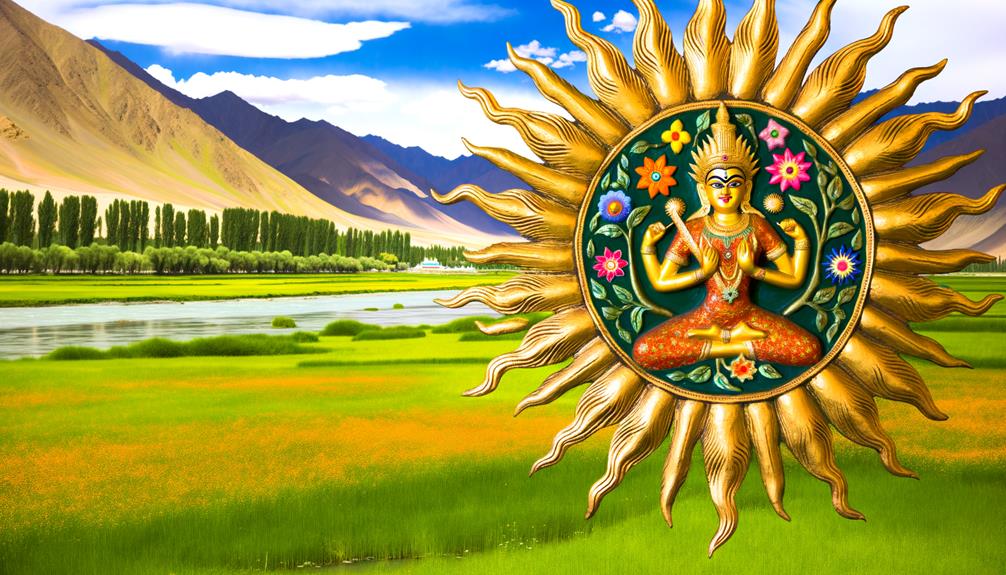Meaning of the Name Surya
The name 'Surya' originates from ancient Sanskrit, derived from 'svar,' meaning 'sun' or 'radiance.' It holds significant cultural and mythological importance in Hinduism, symbolizing the Sun deity who embodies life, energy, and cosmic order. Vedic scriptures emphasize Surya's role in providing light and warmth, essential to both agricultural cycles and spiritual renewal.
In modern usage, 'Surya' represents enlightenment and power, maintaining its appeal through phonetic simplicity and profound meaning. Art and literature consistently depict Surya's radiance, reflecting its enduring cultural resonance.
To uncover more about Surya's historical, cultural, and modern significance, continue exploring these facets.

Key Takeaways
- 'Surya' originates from Sanskrit, meaning 'sun' or 'radiance.'
- In Hindu mythology, Surya is the Sun God symbolizing life-giving energy.
- The name Surya represents light, warmth, and life in Vedic literature.
- Surya embodies spiritual enlightenment and divine authority.
- Modern usage of Surya reflects its symbolic meanings of power, energy, and brightness.
Historical Origins
The name 'Surya' traces its historical origins to ancient Sanskrit, where it is primarily associated with the Sun deity in Hinduism. In the Vedic scriptures, Surya is revered as a crucial force, representing light, warmth, and life.
The Rigveda, one of the oldest texts, frequently mentions Surya, highlighting its significance in early Indian culture. As a deity, Surya is depicted riding a chariot drawn by seven horses, symbolizing the seven colors of the visible spectrum and the seven days of the week.
The etymology of 'Surya' underscores its importance in religious rituals and daily life, reflecting the profound influence of solar worship in shaping cultural and spiritual practices. This historical context underscores the enduring legacy of the name Surya.
Linguistic Roots
Rooted in ancient Sanskrit, the name 'Surya' derives from the word 'svar,' which translates to 'sun' or 'radiance.' This etymological lineage underscores the deep connection between the term and its celestial counterpart.
Sanskrit, a classical language of India, holds a rich tapestry of linguistic heritage, with 'Surya' being a prime example of its expressive capacity. In ancient texts, 'Surya' is often synonymous with light and life, reflecting its integral role in Vedic literature.
The morphological structure of 'Surya' encapsulates the essence of illumination, both literal and metaphorical. By tracing the phonetic and semantic evolution of the name, we gain insight into the profound reverence for the sun in early Indo-European cultures, a reverence linguistically immortalized in 'Surya.'
Cultural Significance
The name Surya holds profound cultural significance, particularly within Hindu mythology where Surya is revered as the Sun God, embodying light, energy, and life.
This veneration is evident in various festivals such as Makar Sankranti and Chhath Puja, where rituals and celebrations are centered around the sun's crucial role in agricultural cycles and spiritual renewal.
These cultural practices underscore the enduring symbolism of Surya as an essential force in both cosmological and everyday contexts.
Hindu Mythology Connection
In Hindu mythology, Surya represents the quintessential embodiment of the sun god, symbolizing both life-giving energy and divine authority. Revered as one of the Navagraha, or nine celestial deities, Surya's significance is deeply entrenched in Vedic literature and epic narratives such as the Mahabharata and Ramayana.
Linguistically rooted in the Sanskrit word 'Surya,' meaning 'sun,' his portrayal often includes a radiant figure riding a chariot drawn by seven horses, symbolizing the seven colors of light or days of the week. Historically, Surya's worship underscores the agrarian society's dependence on solar cycles for agriculture.
His divine role as the harbinger of dawn and sustainer of life underscores his paramount importance in Hindu cosmology.
Symbolism in Festivals
Among various Hindu festivals, Surya's symbolism is particularly prominent during Makar Sankranti, a celebration marking the sun's shift into the zodiac sign of Capricorn. This shift signifies the end of winter and the start of longer, warmer days, symbolizing renewal and prosperity. Historically, Makar Sankranti has been a time for agricultural communities to honor Surya, acknowledging his role in providing the essential sunlight for crops.
Linguistically, 'Makar' refers to Capricorn, while 'Sankranti' denotes change, emphasizing the festival's astrological importance. Rituals such as sun worship, kite flying, and sharing sweets underscore the cultural reverence for Surya.
Therefore, Makar Sankranti encapsulates the profound connection between celestial movements and terrestrial life, highlighting Surya's integral role in sustaining life and fostering growth.
Mythological Associations
The name Surya holds profound mythological significance as it refers to the Hindu Sun God, an essential deity in Vedic literature.
References to Surya can be traced back to ancient Vedic scriptures, where he is often depicted as a powerful figure driving a chariot across the sky.
Symbolically, Surya represents not only the physical sun but also the embodiment of life, energy, and cosmic order.
Hindu Sun God
Surya, revered as the Hindu sun god, holds a crucial role in Vedic texts and is often depicted riding a chariot harnessed by seven horses, symbolizing the seven colors of the rainbow. As the divine solar deity, Surya signifies the life-sustaining force and dispels darkness with his radiant light. His worship dates back to ancient Vedic civilization, reflecting a deep-seated reverence for the sun's essential role in sustaining life.
| Aspect | Symbolism | Representation |
|---|---|---|
| Chariot | Movement of the sun | Rides across the sky |
| Seven Horses | Seven colors of rainbow | Light spectrum |
| Radiant Light | Dispelling darkness | Illumination and knowledge |
| Divine Force | Life-sustaining power | Sustenance and vitality |
Surya's iconography and attributes illustrate profound theological and cosmological concepts within Hinduism.
Vedic Scriptures References
Referencing numerous Vedic scriptures, Surya's significance is deeply embedded in mythological associations that highlight his role as a central deity in Hindu cosmology.
In the Rigveda, Surya is extolled as the dispeller of darkness, the sustainer of life, and the source of all energy. The Aditya Hridayam, a hymn in the Ramayana, further venerates Surya as the supreme embodiment of cosmic order and righteousness.
Linguistically, the name 'Surya' is derived from the Sanskrit root 'svar,' meaning 'to shine' or 'to beam,' reinforcing his connection to light and brilliance.
Historically, Surya's worship can be traced back to early Vedic periods, emphasizing his integral presence in both the spiritual and daily lives of ancient Hindu society.
Symbolic Significance
In Hindu mythology, Surya is often depicted riding a chariot harnessed by seven horses, symbolizing his dominion over the seven days of the week and the spectrum of visible light. This iconography underlines Surya's integral role in the cosmological and temporal order.
Historically, Surya's chariot is driven by the charioteer Aruna, representing dawn, further emphasizing the deity's association with the cycle of time and change from darkness to light.
Linguistically, the name 'Surya' derives from the Sanskrit root 'Svar,' meaning 'to shine,' aligning with his depiction as the radiant sun god.
The seven horses also metaphorically represent the seven chakras, indicating Surya's influence over spiritual enlightenment and human energy.
Modern Usage
The name Surya has experienced a resurgence in modern times, finding its place not only in India but also gaining popularity in various parts of the world. Historically denoting the Sun God, Surya now symbolizes enlightenment, energy, and vigour. Its phonetic simplicity and profound meaning have contributed to its global appeal. A closer look at its modern usage reveals interesting trends:
| Region | Popularity Rank | Common Associations |
|---|---|---|
| India | High | Sun, Energy, Power |
| United States | Moderate | Unique, Exotic, Cultural Heritage |
| United Kingdom | Moderate | Spirituality, Brightness |
| Australia | Low | Nature, Warmth |
| Canada | Low | Diversity, Radiance |
This table underscores the name's cross-cultural resonance and the diverse attributes it embodies today.
Symbolism in Art
Surya's symbolic representation in art spans centuries, serving as a powerful motif in various cultural and historical contexts. In Hindu iconography, Surya is often depicted riding a chariot driven by seven horses, symbolizing the seven days of the week or the seven chakras. This imagery underscores his role as the solar deity, illuminating the world with light and knowledge.
Artistic renditions from ancient temples in India, such as the Sun Temple in Konark, reflect intricate carvings and sculptures, emphasizing Surya's divine importance. In Southeast Asian art, Surya's iconography similarly portrays him with radiance and majesty, highlighting his universal significance.
This consistent representation across cultures underscores the profound impact of the sun deity in art and religious symbolism.
Famous Personalities
Throughout history, numerous influential figures have borne the name Surya, reflecting its esteemed cultural and spiritual heritage. The name Surya, derived from the Sanskrit word for the Sun, embodies qualities of leadership, radiance, and cruciality, making it a favored choice across various domains.
- Surya Bonaly: A renowned French figure skater known for her athletic prowess and groundbreaking performances.
- Surya Sen: An Indian independence activist and a prominent revolutionary leader in the Chittagong uprising.
- Surya Shekhar Ganguly: An acclaimed Indian chess grandmaster with multiple national and international titles.
- Surya Das: An American Buddhist teacher and author, instrumental in bringing Tibetan Buddhism to the West.
- Surya Sivakumar: A celebrated Indian film actor with a significant impact on Tamil cinema.
These personalities exemplify the multifaceted significance of the name Surya.
Conclusion
Essentially, the name Surya encapsulates a rich tapestry of historical origins, linguistic roots, and cultural significance. Its mythological associations and modern usage underscore its enduring relevance.
Symbolism in art and recognition among famous personalities further amplify its stature. As the adage goes, 'A name is a window to the soul,' Surya serves as a distinguished example, embodying a profound legacy that transcends time and geography.






